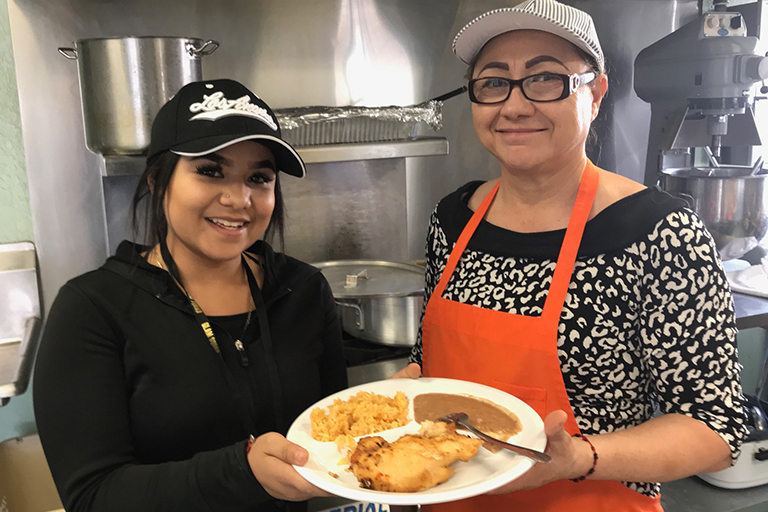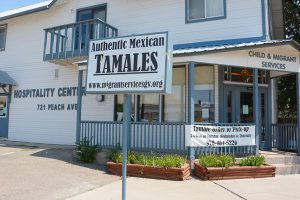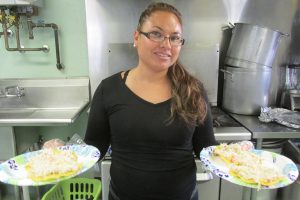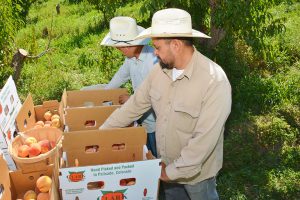By Sharon Sullivan –
Each spring Francisco Pacheco leaves his village and family in Sonora, Mexico, to make the two-day drive to Palisade, Colorado, where he spends six months tending cherry, peach and apricot orchards. It’s an annual trek he has made for 38 years.
As an H2-A visa guest worker, Pacheco comes early in the season to prune and thin trees, then stays for the harvest and fruit packing that come later. His son, a shy 19-year-old also named Francisco, has accompanied his father for the past two years.
On a warm April day, the Pachecos join other farmworkers for a meal at Child and Migrant Services (CMS) Hospitality Center in Palisade. The fare includes chicken stew with sides of beans, rice, salsa and tortillas. There’s also horchata, a traditional Mexican beverage made from rice, milk, cinnamon and vanilla.
Like a lot of farmworkers, the younger Pacheco was homesick the first year he came to the United States. “I missed Mexico a lot,” he says in Spanish. He especially missed his mother and three siblings. Mindful of these circumstances, CMS helps provide these workers and others with a little bit of comfort and support while they are far away from home.
A group of Palisade farmers’ wives founded CMS around a kitchen table in 1954. They wanted to provide basic services for their workers during an era when treatment of farmworkers in the United States was often dismal. The center, located in a 100-year-old Victorian house at 721 Peach Avenue, provides a welcoming place. CMS workers can find assistance with language translation and transportation, and accessing dental and medical care. Additionally, the center serves supper three times a week to workers who’ve been working in the fields all day. Familiar foods like chicken mole, tostadas, tamales, beans, rice and tortillas are meant to show appreciation and provide a bit of home away from home.
On meal days, CMS cook Maria Lopez comes to the hospitality center at 11 a.m. to begin cooking the pinto beans. The 55-year-old grandmother concocts delicious meals from whatever she has on hand. “I just see what’s available and figure out what I’m going to do with it,” she says. “I’m always inventing something.”
Provisions come from the community food bank and a CMS budget that allows for buying some essential grocery items. A recent food drive by Grand Valley Interfaith Network, plus a 50-pound bag of pinto beans donated by Colorado State University Extension Service, help fill the pantry.
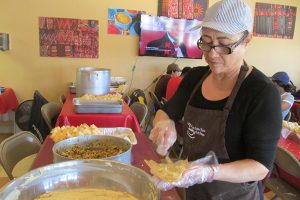
CMS cook Maria Lopez, who has come from Mexico the last 10 years, cooks everything from scratch for the meals served to workers.
“She cooks everything from scratch — she wouldn’t dream of opening a jar of mole sauce,” CMS Executive Director Karalyn Dorn says of Lopez. “It’s homestyle, hearty and filling. We always try and provide a balanced meal. It’s authentic Mexican food.”
By 4 p.m., the beans and rice are cooked, the tortillas warmed and the meat entree is ready. Small bowls of fresh-made salsa are placed on each of the six long dining tables covered with red- or maroon-colored vinyl tablecloths. Colorful photographs taken by Palisade resident Tim Wedel during a trip to Guatemala seven years ago decorate a wall inside the dining room. The foam core-mounted photographs are of handwoven textiles and various food from an outdoor market.
“The intention of CMS at the time was to make it feel more like home; (the photographs) spoke to food and of home,” says Wedel, who donated the images. There’s also a flat-screen television mounted to the wall with news from Mexico — a subscription service from a donor.
Though the sign on the door says meals are served from 4:30 to 6:30 p.m., Lopez never turns away latecomers. It’s typically 8 or 9 p.m. before the dining room and kitchen are cleaned, and the food and pots put away.
During the height of the growing season, more than 70 workers come for the thrice-weekly meals. “It helps get them through the part of year when there’s not a lot of work,” says Peg Martinez, a part-time community health worker. “It’s nice for the guys to get a homemade meal after a long, hard day. There is no line to get into. They get served. It’s a matter of ‘we value you and thank you for doing a good job.’”
Dorn, a petite, Spanish-speaking former Peace Corps volunteer, became director of CMS in 2015 after working for several years as the nonprofit organization’s operations manager and program manager. From her tiny office adjoining the dining room, she sees and greets workers as they enter the hospitality center. “I like interacting with the workers more than anything else,” Dorn says.
An unexpected donation in 2018 allowed Dorn to expand the meal program by offering dinner once a week for two months earlier in the season when workers come to prune trees.
While some farmworkers will return to Mexico or Central America after completing the pruning, others, like the Pachecos, stay for the later tasks of harvesting and packing, surviving on their savings until then.
The surprise financial gift came after Grand Junction resident and longtime volunteer David Spies passed away. In the dining room, a framed photograph of Spies wearing a white apron stands next to two large potted geranium plants underneath the window. A disabled U.S. Marine Corps veteran who didn’t drive, Spies would ride the city transit bus 12 miles from Grand Junction to Palisade to help serve meals and practice his Spanish with the farmworkers. After his death, Spies’ family “made a really nice donation in his memory,” Dorn says. “They’re lending us a hand in building our capacity in this organization.”
On a shoestring budget and with a small staff that includes herself and four part-time employees, Dorn relies heavily on volunteers. Throughout the year, 114 Grand Valley residents donate time serving meals, helping out with special events or making tamales, which is an ongoing CMS fundraiser.
Bob Ricketts and his wife, Donna Schultz, of Grand Junction come weekly to help Lopez in the kitchen, particularly with cleanup after the last meal is served. Schultz has volunteered for multiple Grand Valley organizations and says CMS is her favorite.
Schultz admires the farmworkers. “They’re skilled workers. I grew up on a farm. They work harder than anyone,” she says. “They come here (to the hospitality center) for camaraderie.
“Here, there’s this amazing gift of family — the workers send their money home,” she adds. Many of them, like the Pachecos, also call home to Mexico every day. “Cellular phones have changed everything,” allowing farmworkers more contact with their family members, says Richard Maestas, who worked as a CMS community health worker for 12 years before retiring last year.
Another volunteer, Larry McKenna, collects broken bikes that he repairs then donates to CMS to give to the farmworkers and their kids. Dorn held a free raffle recently after a particularly nice bicycle was donated. The man who won the bike was in another room talking on his cell phone to family in Mexico when his name was drawn. His peers broke out in cheers for their friend who shares the bike with his fellow workers.
Several refurbished kids’ bikes were given away during a gathering called Día del Niño (Children’s Day, a national Mexican holiday celebrated April 30). Dorn says she wanted to observe the holiday in Palisade this year to “lift people’s spirits” in light of recent changes in immigration policy. Roughly 35 mostly women and children attended the event, which included a library-sponsored puppet show, a simple meal of chicken salad tostadas and a piñata full of candies for the kids.
“There are two main audiences that we work with: single men, including guest workers and freelance migrant workers, and then families, who came here originally as migrants and ended up settling,” Dorn says. Many of the women work in peach packing sheds and vineyards or in town as housekeepers.
While Lopez cooks in the kitchen, her husband, Jorge, tends to the Palisade orchards. During the grape harvest, she also works in the fields. They arrive in Palisade in April and return to their home in Sonora, Mexico, in October. They send money to children and grandchildren who remain in Mexico.
“For us it’s better to come here and work than to stay in Mexico where there is no work,” Lopez says. “When we go back we have our savings. We’re saving money the whole time we’re here. We use it in Mexico to pay any debts we have or buy things we need at home.”
Lopez has also worked in Arizona in the citrus fields and at housekeeping jobs. She and her husband have come to Palisade, however, for the past 10 years. “I like to cook,” she says. “I cook here; I go home and cook; I cook at my son’s house on the weekend. In my husband’s village, I cook for his family. Even on the way home, I have relatives in Arizona where I spend a whole day making tamales.”
Palisade peach grower Bruce Talbott, whose grandmother Margaret was one of the founders of Child and Migrant Services, says its mission changed slightly over the years as fewer families come to the United States than in the past. These days the workers are mostly men, traveling alone, spending months away from their families. CMS is unique, and the reason for Palisade’s dependable labor force for its orchards and vineyards, Talbott says.
“Most of the workers are from Mexico (and) come year after year,” Dorn adds. “They know they have us for support. We like to think of Child and Migrant Services as a home away from home.”
Sharon Sullivan is a freelance writer from Grand Junction who loves to write about friends and neighbors on Colorado’s Western Slope.

